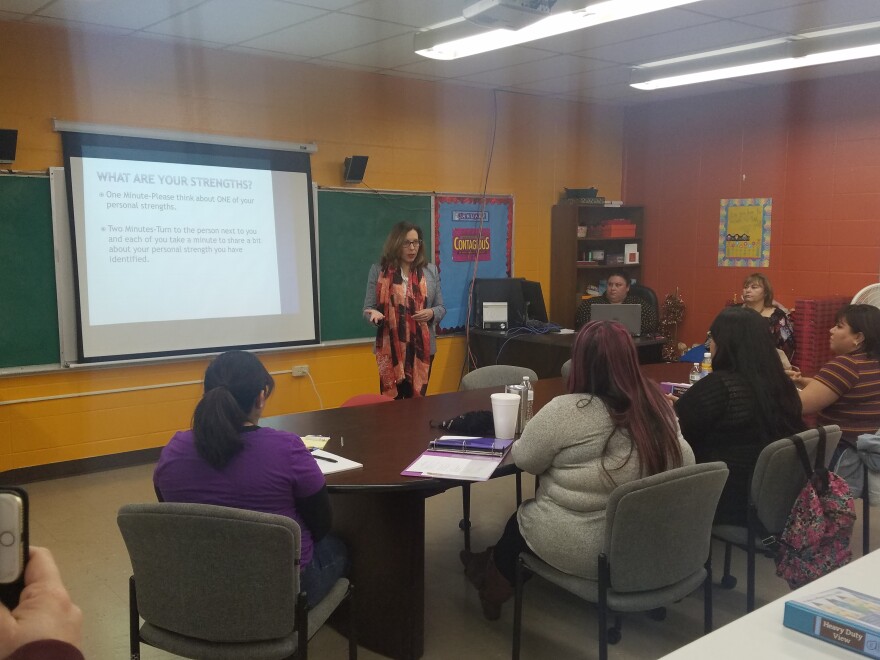Incidents of child abuse in one San Antonio district are decidedly higher than in other parts of the city. In 2016, roughly 179 children, who were victims of abuse in District 5, were removed from their households. That’s an increase of 58 cases from the year before. A majority of those cases come from the 78207, a west side zip code.
Now a pilot program has been created to help reverse that trend by using members of the community to reach out to at-risk families. The Promotoras Child Abuse Prevention Initiative will employ the use of nonprofessional, trained community members known as “promotoras,” who provide basic health care education to the community.
San Antonio City Council District 5 representative Shirley Gonzales said the high incidents of child abuse there are mostly related to poverty.
“It was brought to my attention that over 30 percent of all child abuse cases in Bexar County are coming out of two zip codes in my district,” she said. “I just had a baby two months ago, I’m the only mother on the council, and the only member of the council that has young children. So this was something I felt we had to tackle.”
Gonzales also lives in the 78207 zip code.
“If we could focus just on the (78207) zip code … we could see a significant decrease in child abuse,” she said. “So what would it look like if we dedicated funds and resources and effort and energy into addressing child abuse just in the ‘07 zip code?”
Family Service Association is a San Antonio nonprofit serving the community for more than 115 years, providing services such as helping children, families, and seniors overcome financial and social challenges. The organization has a history of training promotoras at the Westside Education Training Center.
Victoria Salas, project manager for the Promotoras Child Abuse Prevention Initiative at Family Service Association, said veteran promotoras recruited some of the participants for the pilot program. She said the new promotoras will receive training specific to child abuse prevention.

“They’re going to get the parenting nurturing training curriculum. That’s going to be their specialty,” she said. “They’re going to have the community health worker training (at the Westside Education Training Center).”
When the pilot program is completed in two years, Family Service Association will hire four graduates: two part time and two full time. “The two part-time are going to be placed in an organization in the 78207 zip code to give another organization leverage and partnership with us,” Salas said. “With the other promotoras, they might not be hired. (But) we’re going to give them different resources. Let’s say we hire one promotora, and (if) for whatever reason she can no longer continue working, we have a pool to draw from that’s already trained in the curriculum.”
Salas said upon completion of the pilot program, educational and employment opportunities for the promotoras will expand.
“They could continue their education,” Salas said. “There (are) a couple who will continue because they have spoken to me and said ... ‘I didn’t know I could learn this much. Now I can be a better parent with this information I have received.’ ”
Gonzales said unemployment is high in the 78207 zip code, and the promotoras program could make a difference.
“This would give those women the opportunity to further their education and hopefully get long-term jobs,” she said. “That also helps to stabilize the family.”
And community members working together can also help stabilize a community, Gonzales said.
“Anytime you’re trying to change a culture, the best way to do that is peer-to-peer. Not some institution coming in and making demands. The promotoras are working within their own peer network,” she said. “They themselves have experienced, perhaps, domestic violence. They themselves have experienced, perhaps, many of the same things they would be working with their peers on.”
Gonzales added, “We know that hearing from your friend, hearing from your comadre, hearing from your mom is much more impactful than hearing from a professional who you may not have any bond with.”
And promotoras can help provide access to state agencies and other services in case families need additional assistance.
But despite the potential positives, Gonzales said it might be difficult to get funding since results are difficult to measure.
“It’s hard to quantify a relationship or a friendship,” she said.
Still, Gonzales said the pilot program is teaming with University of Texas at San Antonio to collect information to determine whether the program is successful. “And if it is,” she said, “then we’ll look for other funding sources. It could come from the city; it could come from the county; it could come from private foundations; perhaps the United Way could help. We’re looking for two years for this program, hoping we’ll show a decline in repeat incidents of child abuse.”
And if the program can help decrease instances of child abuse, Gonzales said other social problems might be addressed, as well.
“Child abuse is linked to domestic violence, linked to pregnancy, linked to other types of trauma,” she said. “If we can hopefully tackle this one part, it connects people to other services so people know there’s another way.”
Norma Martinez can be reached by email at norma@tpr.org and on Twitter @NormDog1





